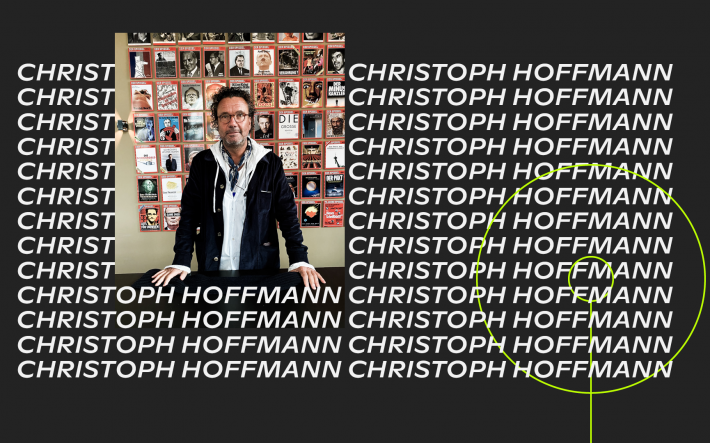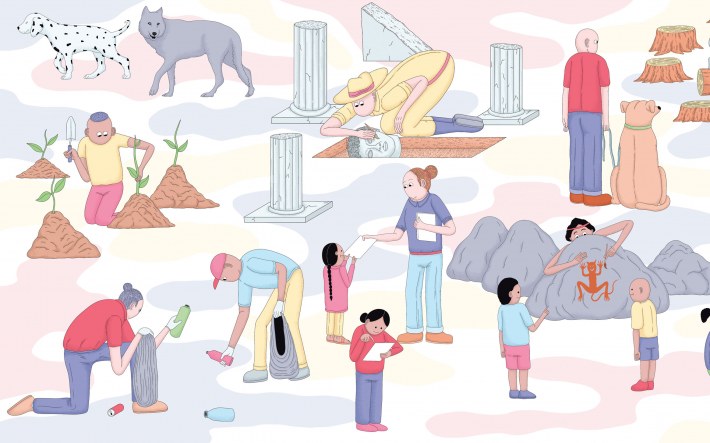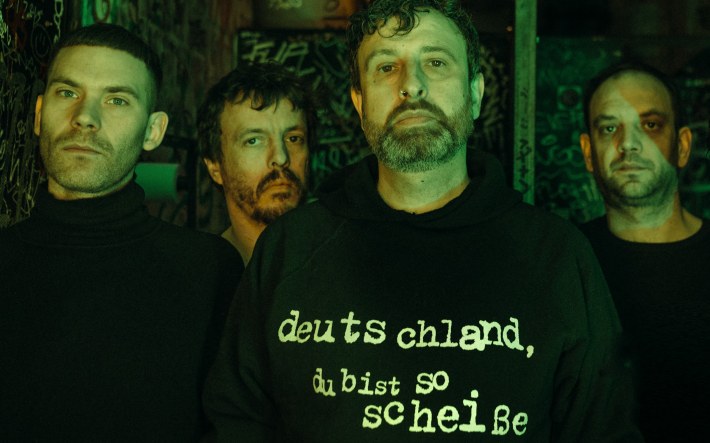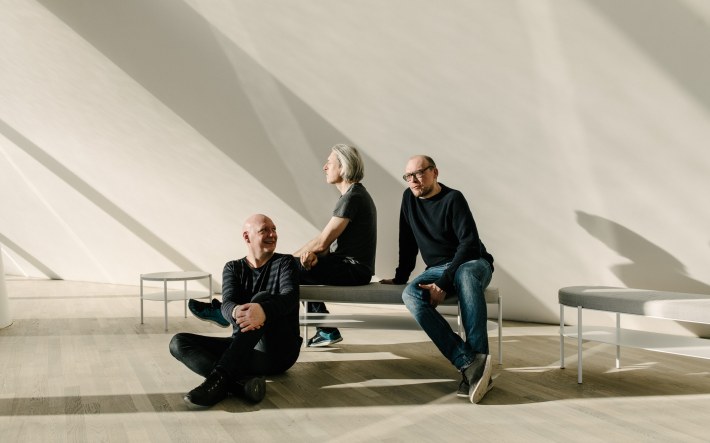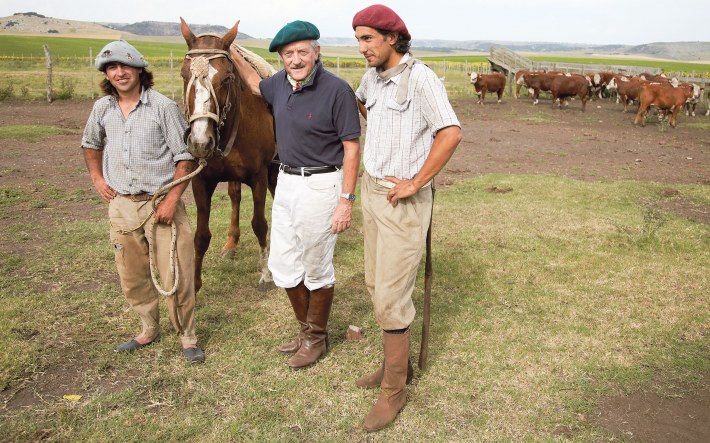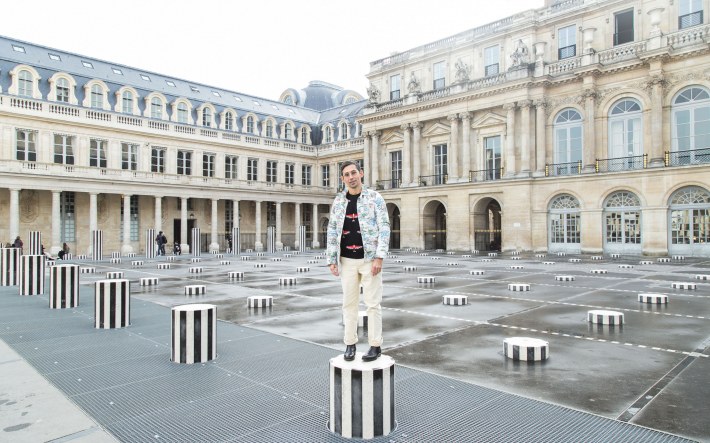The Present is Female
The music scene is a domain in which women have traditionally been on the passive side of things: as muses, as fans in front of the stage, or as groupies. Does that sound a little antiquated? Indeed it is! There have long been amazing women involved in front of, behind, or next to the stage.
It’s time for gender balance to be introduced to festival lineups, for the gender pay gap to close in creative industries, and for women to take executive positions at major labels and established music magazines. Does this sound like a somewhat utopian fantasy? Hardly! If we take a look around the scene, we see significant female players who are making noise, creating new spaces, and, in doing so, changing the game. That’s why this edition of COMPANION is focused on the music world in Berlin, profiling women who make the industry so captivating: DJs, singers, event organisers, writers, and activists.
Hoe__Mies: The Freedom to Party
A series of parties as a social statement: Lucia Luciano and Gizem Adiyaman organise events that serve as alternatives to the male-dominated hip-hop scene. Parties for women, the queer community, people of colour. Not only are they successful in realising this aim, but they’re also polarising opinions. COMPANION speaks to them about vibes, scepticism, and R. Kelly.

COMPANION: What drove you to start your own party series?
Lucia Luciano: When we were out partying, we often didn’t like the atmosphere. We simply noticed that there was something missing on the hip-hop scene for us. As a woman, you can’t enjoy nightlife as you may want to. Wearing the wrong clothes can be a direct invitation to be misunderstood. We found that annoying.
Gizem Adiyaman: Exactly. When you go out, you should be able to let your hair down. You should be able to express yourself however you want — without any restrictions or fear.
So you’re using your events to create a safe space within the city’s nightlife?
Lucia: We are always working to create safe spaces, but of course we cannot make any guarantees. The decisive factor is always having a certain amount of consideration for the people around you. At Hoe__Mies parties, you look after one another and make sure that everybody feels comfortable. It works really well. The vibe is totally enjoyable.
You started out with your project around two years ago. Did you receive a lot of backlash?
Lucia: In our circles, we always had support and primarily positive feedback after the events.
Gizem: Of course whenever something new is started, there are always sceptical comments. At the beginning, we were told that we would have to book some male DJs sooner or later, otherwise nobody would come to our events. That turned out to be wrong. [laughs]
Absolutely. You guys are unbelievably successful at the moment — and currently on tour as a support band for Bilderbuch. How did that come about?
Gizem: I was playing an event in Vienna, and Maurice [the lead singer of Bilderbuch] also happened to be there. He really liked my set and contacted me. Before that, I didn’t really know Bilderbuch that well, but on their invitation I played at their after party. And at some point came the invitation to join them on tour.
Lucia: That was very different to playing at a club. We have to host and engage with the crowd in a very different way. But it works and is a lot of fun.
So Hoe__Mies has been more than just a side project for a while now?
Gizem: We both work more or less full-time on the Hoe__Mies project.
Lucia: It’s not just about the DJing and the parties. We’ve now also become a platform for other female artists. Sometimes we are even contacted by bookers who want recommendations from us about female or queer DJs they can book for their events. We also have more projects planned for Hoe__Mies this year. So it’s still all going on here.
Unfortunately, female artists still do not seem to have proportionate visibility.
Gizem: Absolutely. But it’s more about the fact that the entire infrastructure in the business and scene is male dominated.
Lucia: In our public playlists, we make sure to present primarily female and queer artists.
In addition to music, you also raise your voices for other things that are important to you. Together with journalist Salwa Houmsi, you fought for the immediate cancellation of gigs scheduled in Germany by R. Kelly, who was facing allegations of sexual abuse.
Lucia: We stand up for what’s important to us. Black women deal with different forms of oppression in their lives, and are often not visible — we wanted to show solidarity with these women who were and are R. Kelly’s [alleged] victims.
Gizem: You can also notice that things are happening in the business in that respect. Previously, musicians enjoyed a certain amount of immunity. That’s changing now; people are more conscious of these matters. However, a petition can’t do everything. We have to go further.
Gosh Magazine: Brave New Music Journalism
The print market is suffering. For many years now, people have predicted its slow but certain demise, and a particularly heavy blow was dealt to the field of pop culture in 2018. In Germany, Intro closed down completely after 25 years of operation, and Groove and Spex are no longer published in print, but are now trying out an exclusively online service. It’s not the most opportune time to bring a new printed music magazine onto the market, one might think.
Not Jördis Hagemeier and Sophie Overwien, however. Their new publication, Gosh Magazine, was first published at the beginning of 2019. ‘I don’t believe the print media industry is dying out. It’s just that the demands of the market are changing,’ explains Jördis. ‘Of course you can simply go online to find out information about bands or tour dates. However, good articles and stories are always better on paper.’ Jördis is a freelance journalist living in Berlin. Sophie works as a graphic designer and lives in Düsseldorf. The two have been friends since school, bonding over their shared love for techno clubs.
Gosh is a magazine devoted to the relationship between pop and design. It centres on the mutual influences of aesthetics, design, and music. ‘We didn’t want to engage with either the subject of design or the subject of music too strongly. Design magazines are often overly intellectual, and music magazines can be too nerdy,’ Sophie explains. ‘I think that we have managed to do a good job.’

The two have been working on turning their shared project into a reality for a long time, and there were lessons learned on the bureaucratic front in particular. ‘It’s astounding how complicated it can be to record creative processes on paper. In any case, it was something of an adventure to get a barcode for our magazine,’ Jördis explains, laughing.
She and Sophie are in agreement on the topic of gender equality: gender should have stopped being a consideration a long time ago. ‘For instance, we had a male artist on the cover of our first edition. We have worshipped Ross From Friends for years, and were delighted to get him on board for our magazine. He made it to the cover because we like his music — not because we thought it would sell well. It could just as well have been a woman. ’The magazine was financed by crowdfunding campaigns, so the project is completely independent — it’s the two partners themselves who set the rules. ‘We actually planned to publish twice a year. But we’ll have to see how that works out time-wise,’ explains Sophie. Jördis adds, ‘We don’t want it to take over our lives completely. That can really burn you out! If we manage to get a second edition out this year, that’s cool. If it comes later, that’s fine too. But there will definitely be more editions, and we are looking forward to that.’
No Shade: Collaborate, Not Compete
There’s a lot more behind the expression ‘to throw shade’ than a simple insult. ‘Shade’ is a slang word that originated in the queer Latino scene and was first made known to the public in the documentary ‘Paris Is Burning’, released in 1990. In the film, director Jennie Livingston profiled the New York drag scene of the 1980s, where the subculture of vogue balls allowed for the recognition that society had otherwise denied it.
It seems to be no coincidence that the Berlin-based DJ and artist collective No Shade references this. Founded around two years ago, its 17 members aim to increase the visibility of women and non-binary people in the DJ business. ‘The initiative was taken due to a clear gap and need for it in the local scene in Berlin,’ explains No Shade member Ves Holseter, referring to the homogenous DJ scene that, even in a city as diverse as Berlin, is still mainly dominated by white cis men. ‘Our philosophy is to provide an opportunity and a platform, contribute to even out the balance, and bring different identities together through collaboration.’ In concrete terms, that means that No Shade sees itself as a mentoring programme for aspiring DJs. That’s why the lineup of each of their regularly scheduled parties supplements well-known headliners with two slots reserved for newcomers. To prepare the emerging DJs for the task as well as possible, No Shade offers a monthlong training programme, where experienced mentor DJs offer guidance with live hardware and software, and also pass on personal wisdom during private DJ sessions.
However, Ves is not under the illusion that the many excellent and diverse DJs will get rid of the homogenous all-male lineups on their own. ‘A 50/50 quota shouldn’t really be necessary, because the DJs and quality are already there. Yet people tend to stay in their own box. So until the industry opens its eyes, maybe it could use a push in the right direction.’ No Shade wants to give the industry precisely this push. It is also especially important to the collective to ensure that the artists’ performances are given more than just immaterial recognition. The DJ gigs that newcomers book are all paid. Ves hopes that the public and the industry will be more prepared to pay female and queer artists better — the gender pay gap doesn’t stop at the party scene, unfortunately. Above all, Ves also hopes to see an increase in diversity among booking agents, managers, and journalists, and ‘More collabs than competing’. In other words, no shade.
Jayda G: Move to the Front!
Jayda G’s earliest musical memory is seeing her father sat among stacks of CDs in their living room, recording mixtapes for long road trips. In her home country of Canada, car journeys can easily take several days. In the car, they listened to her father’s favourite disco, soul, and R & B classics while mountains and forests passed by outside. It’s therefore no wonder that she later studied environmental and resource management — and became a DJ. ‘The connection between music and the environment is the essence of what I grew up with,’ answers Jayda G when asked how these two areas fit together. From there, it was a logical step to address the subject of climate change in her debut album ‘Significant Changes’, released in March 2019, with house beats you can dance to. ‘I produced the album at the same time as I was completing my studies, where I was dealing with the health impacts of chemicals on orcas by the coast of Vancouver.’ That’s why on the ambient track ‘Orca’s Reprise’ you can hear whale song, and in ‘Misty Knows What’s Up’, she samples the biologist Misty McDuffee, who has spoken in court about protecting marine life. Is the escapist dance floor the right place for political statements? ‘You can’t run away from the environment,’ says Jayda G. ‘If people are in a positive state of mind and more open to these issues when confronted with them, they might resonate better.’

But Jayda G doesn’t want to preach; instead, she primarily wants to bring positive energy back to the club scene, which often takes itself too seriously. In 2016, she moved from Vancouver to Berlin, and has played somewhere in Europe almost every weekend ever since. During her DJ sets — where she mixes Grace Jones with Diana Ross, and disco and tropical beats with soulful house bangers — Jayda G will be the one dancing the most and singing along to each chorus the loudest. With her hymn of empowerment ‘Move to the Front’, she encourages women to come to the front during her sets and break through the wall of ‘fist-pumping bros’, which is how she jokingly describes the homogenous groups of men on the dance floor. As a woman of colour in a male-dominated DJ business, Jayda G knows that she needs to set an example.
As such, the best kind of validation for her is when women and people of colour feel empowered and represented by what she’s doing. ‘Once, after a set, a woman said to me, “Seeing you up there being yourself gave me the power to be myself.” That was the biggest compliment I could receive.’
Katinka Brundiers: Never Boring
Katinka Brundiers came to Berlin in the mid-90s, and recently moved to the edge of the city with her family. ‘A few more trees than people. We liked that,’ she says. However, with her Zwergstadt project, she is in the middle of it all summer long anyway. Katinka and her crew make their way to festivals like Lollapalooza to make sure that the littlest festivalgoers are entertained. ‘We are kind of like a mobile retreat for children.’ Katinka started Zwergstadt five years ago, and it seems to have struck the right chord ever since.

The project began at a time when the music scene had already changed. CD sales had not been bringing in the big money for a long time, and the public were more keen on events and experiences. The result: festivals became increasingly popular, and their diversity grew. As such, there were suddenly new demands that hadn’t been there before. Where should the kids go when you want to go to a festival as a family? In front of the stage with Mum and Dad to watch the bands? That would get boring in the long run! At A Summer’s Tale, for instance, visitors can look forward to not only a well curated lineup, but also to wine seminars, various workshops, readings – and entertainment for children that is just as good as the schedule for adults. ‘It was only when I became a mother myself that I realised that this kind of thing didn’t exist. And to start a business myself, to be my own boss — I’d wanted that for a long time anyway.’ Katinka already had the experience of straddling different careers. She worked as a social educator and in Berlin’s music scene on the side. She gained experience in booking and PR, and organised events. ‘It was always a good balance. The two fields have a surprising amount of overlap, such as a focus on communication. At the same time, however, there are also big differences, because everything moves very quickly in PR. In my social education work with families, that’s very different — there it’s all about slow breathing, understanding, and patience.
’With Zwergstadt, Katinka was able to bring both of her career specialties together perfectly — and her personal development and changes to her private life were also reflected in it. ‘At some point, I was just no longer interested in nightlife, neither privately nor professionally. Of course, that comes with age — when you enter into different phases of your life — and for me it was when I became a mother.’ That doesn’t have to mean that you just have to stay home, though. With Zwergstadt, Katinka is a strong representative for a new way of parenting. Her project invites parents to continue indulging in old preferences. But that doesn’t mean that having a child doesn’t change you: ‘It is definitely a new phase of life, with many new concepts and a different everyday routine,’ she says. However, Katinka doesn’t understand the general assumption that becoming a parent means putting an end to certain activities. Enjoying music and having fun at festivals work best with your loved ones in any case — even if you might have different tastes. ‘Our oldest son loved David Guetta at the last Lollapalooza. That’s not really my kind of thing now. But it’s nice to see children get excited about music and concerts.
’Katinka is currently working full-time on Zwergstadt. Her team, all of whom have a background in education, is constantly growing due to its success. Does Katinka sometimes miss her other jobs? ‘Not yet. The work before and at the events is also exciting, creative, and varied. But who knows what the future will bring? ’ Clearly there are a few new ideas swimming around in Katinka’s head, just waiting to be put into action. Anything less would be boring.
MADANII: Provocation in Balance
For her band, Madanii, Dena Zarrin writes about the dark hair on her arms and about the razors she removes it with to fit in. In her latest music video, she is shown bound, facing the camera, and surrounded by soft pastel tones and gentle pink. Her Iranian heritage, her own identity, bondage fantasies and aesthetics — Madanii brings all of this together. Understated, intensive, and hypnotic. In doing so, Madanii challenges the audience — and draws attention to their own viewing habits and prejudices.
The duo Madanii, which consists of Dena and producer Lucas Herweg, met at the Popakademie in Mannheim. With this project, Dena found an opportunity to capture her world through art. She deals with her youth and childhood in the countryside as a child with a migration background. She questions norms and discrepancies, and does so in a wonderfully melodious way. Trap, R & B, avant-garde pop — though Madanii needs no labels, in any aspect of life. In an interview with COMPANION, front woman and songwriter Dena reveals why.

COMPANION: Your look — both on stage and in videos — is sometimes rather extreme. Where do you draw your inspiration from?
Dena Zarrin: I like to playfully blur the lines between things that seem antithetical: foreigner/German, Orient/Occident, free expression/modesty, fiction/authenticity.
What kind of reaction do you want to elicit from your viewers?
All of the concepts referred to are associated with stereotypes and trigger something within the viewer. In addition to aesthetic appeal, I am most interested in creating moments of discomfort, which people would ideally engage with in a retrospective and reflective way.
That seems to have been successful in your video for the song ‘Holes/Mvnia’. When you think of bondage, you tend to think of latex and leather. Instead, Madanii draws its viewers into a beguiling world of glitter and pale pink.
We wanted to play with expectations in an active way. After all, what is normal? However, we also wanted to create a sense of the surreal, which is why we chose this colour palette. In terms of content, it’s about showing that we are all bound in certain kinds of corsets — society encompasses all of us. During the course of the video, I loosen the knots — a process of liberation.
Does this reflect your own story?
Definitely. My family comes from Iran and people can tell that by looking at me. It’s not that I feel foreign in Germany, but my cultural background follows me wherever I go. For me, growing up also meant dealing with my own identity.
A grant from Musicboard Berlin allowed you to visit the Iranian capital, Tehran. What role did the month you spent there play?
It wasn’t a cliché ‘homecoming’ story or anything like that. But it was surprising to suddenly be somewhere where my look fitted in and I spoke the language. At the same time, I also realised that my German identity and how I grew up have also played a considerable role.
Do you express that through your music as well?
Yes. With Madanii, we like to push the limits. We like to challenge. My time in Tehran will certainly also be reflected in my next songwriting sessions with Lucas. We already have an EP planned for this autumn.
Perel: Hits Hits Hits!
A blonde female bodybuilder poses in a glittery bikini and bridal veil, in front of an industrial wasteland with a hammer in her hand. Annegret Fiedler, aka Perel, who is sitting next to her in the dust wearing a bright red jumpsuit, sings: ‘Soll der Teufel mich doch holen, es ist längst zu spät!’ (Let the devil take me, it’s already too late). At the same time, she stares manically into the camera, giving a look that Nina Hagen would be proud of. The video for the song ‘Gold und Silber’ (gold and silver), for which Perel lent her vocals to the New York post-punk artist Curses, looks like an absurd scene from a David Lynch film. At the same time, it perfectly illustrates how difficult it is to determine what the musician from Saxony actually does.

That’s because Perel is a DJ, producer, singer, and performer — usually all at once. She likes to take to the microphone during her DJ sets to improvise, sing, and whisper ecstatically over pumping electronic beats. ‘I can understand people who ask, “What on earth is she doing up there!?”’ she says in an interview. However, she has always found strict pigeonholing and labels to be boring. ‘If I describe myself as just a DJ, that ignores about 70 percent of what I doas a musician.’
When she was growing up in the Ore Mountains, the trained vocalist tried everything from church choirs to punk bands, wrote her own songs, and, at some point, realised that she didn’t need a band to create her sound — thanks to digital production software. ‘If, like me, you have been involved in different bands and projects for a long time, it can be very liberating,’ Perel says of her epiphany. That was in 2008.
Perel wanted to make it as a professional musician. In 2010, she moved to Berlin and sent demos to countless label, but never got a response. Just when she thought she had completely failed, she wrote the two songs that would change her life: ‘Die Dimension’ (The Dimension) and ‘Alles’ (Everything). She sings melancholy lyrics in German over a dark mix of minimal wave, industrial, and 80s synth pop. The deep timbre of her voice has already earned her the nickname ‘Techno-Knef’ (Referring to the famous German singer Hildegard Knef). ‘Both songs are snapshots, written and produced at a time when I was suffering from deep-seated fears about my future. Fears relating to the overall global situation, but also those relating to my personal situation.’
She certainly had few concerns about her career afterwards. The electro-punk label DFA Records, launched by James Murphy of LCD Soundsystem, released her debut album, ‘Hermetica’, in 2018 — the New York label’s first German signing ever. Perel made it onto ‘Best Album of the Year’ charts, and was considered to be one of the year’s best newcomers. ‘DFA definitely opened the doors to another world, one in which I’m lucky enough to be able to tour all over the world and get to know inspirational people and locations.’
Last year, she played around 100 gigs across the world. In her DJ sets, she mixes contemporary house and techno with old classics — so perhaps it’s no coincidence that she chose the slogan ‘Hits Hits Hits’ for her merch T-shirts. And why did she recently move from Berlin, the techno capital, to Amsterdam? ‘I thought it was time for something new.’ So we can certainly expect a few things from Perel over the coming years.
Gurr: Showpiece Punk
Two women known for tightly plucking their strings still appear to be a sensation. Andreya Casablanca and Laura Lee are always mentioned when female rock comes up. Terms like ‘new wave riot grrrls’ quickly put them into the early 90s and grunge categories. The Berlin duo’s sound is in truth even more diverse: catchy pop refrains, bold and playful lyrics, and completely unpretentious punk are brought together — and anyone who has seen the pair live will know that Gurr is essentially just great fun.COMPANION sounded the band out in an interview with Andreya
COMPANION: Gurr was founded in 2012, and your first EP came out three years later — so you’ve been around for a while. What’s been your biggest insight into the music industry so far?
Andreya Casablanca: I think you’re always learning about it, but right now I’d definitely say it’s to follow your gut, otherwise you won’t be happy. Everyone has to find their own place and therefore ask themselves what they want to achieve and how they’re going to get there.
You’re often listed as a showpiece guitar girl band. Does that ever annoy you?
Never. In Germany, it seems that women in rock music is still a ‘new’ concept to the industry and press. That won’t be the case after us.
Women still appear to have it more difficult than men when it comes to starting a career in the music industry. Do you agree?
Some parts of the industry feel like a boys’ club — from people in the business to concert goers and their comments. We neither put up with it nor feel intimidated by it. We just want to be surrounded by great people, whatever their gender.
Your EP ‘She Says’ has just been released. The record is more cheerful and dreamier than your previous sounds.
We’ve recorded and written more than we’ve released, and we’ve grown a lot since our first record as well, of course. Musically, we are now in a place where everything sounds somewhat calmer. All of our new songs make sense for us.
Gurr has been pretty successful. What’s next?
We’re playing a lot of festivals over the summer and hope to be able to work on new music in the autumn and winter. The last few months have been really intense. You always have to make sure you don’t lose yourself, and remember who you are — personally and artistically.


